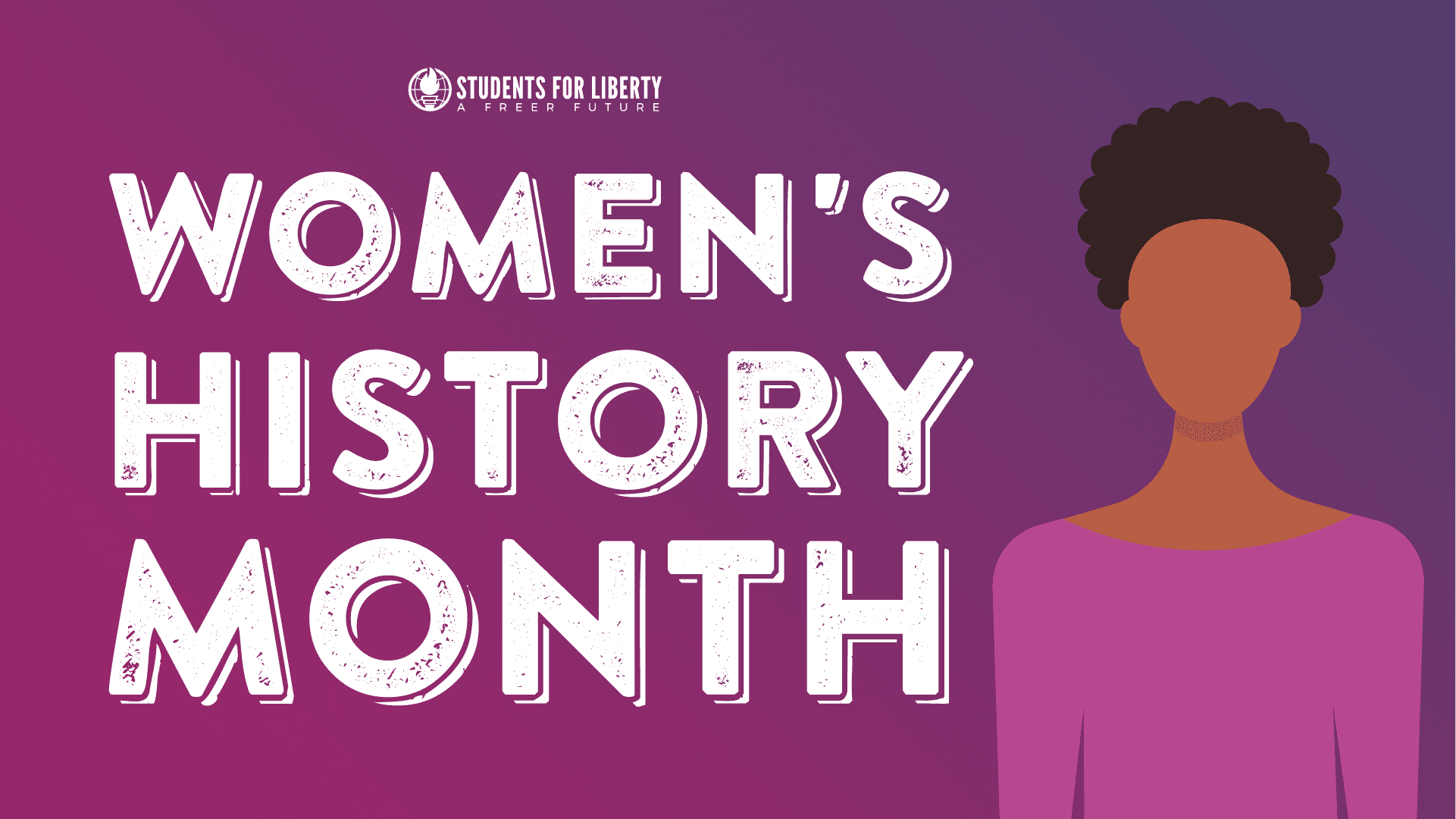Women’s History Month serves as an opportunity to celebrate the many great women in history who have contributed extensively to the advancement of liberty. Unfortunately, designers of state school curricula are notorious for cherry-picking which historical figures should be studied ardently, while often excluding the contributions of women who have worked towards the advancement of a freer future.
This Women’s History Month, let’s take a look back at some game changers who’ve paved the way for individual liberty.
1. Ayn Rand
Ayn Rand (1905-1982), a Russian-American author, playwright, and philosopher, was one of the most significant thinkers of the twentieth century. She is most famous for her novels, which include Atlas Shrugged and The Fountainhead.
Throughout her work, Ayn Rand promoted her philosophy of Objectivism, wherein reason is the only means of acquiring knowledge. She was staunchly opposed to all forms of collectivism and to the initiation of force, holding laissez-faire capitalism as the utmost ideal. Ayn Rand’s work has played an influential role in discussions around liberty, and remains as relevant as ever to this day.
2. Mary Wollstonecraft
Mary Wollstonecraft (1759-1797), an English writer and philosopher, was a prominent early advocate of women’s rights. She is often considered to be one of the founding feminist philosophers.
In 1792, she published what is arguably her best known work, A Vindication of the Rights of Woman. Wollstonecraft decried a lack of educational opportunities for women, and asserted that both men and women should be treated as equal, rational beings. She promoted a changing social order where a greater emphasis would be placed on reason.
3. Isabel Paterson
Isabel Paterson (1886-1961) was a Canadian-American novelist, journalist, philosopher, and literary critic. Born on Manitoulin Island, Ontario, to a farming family of extremely modest means, she spent her childhood moving around parts of Canada and the United States as her parents sought work. Always an avid reader, she eventually became the secretary for a newspaper publisher in Spokane, Washington. At this point, she started writing editorials wherein she expressed her fervent support for free trade.
Paterson is known to have written over 1,200 newspaper columns as well as numerous novels. However, her most famous work was The God of the Machine, published in 1943. This book, a treatise on political philosophy, became widely regarded as a foundational cornerstone of libertarian thought. A fierce anti-collectivist and a friend of Ayn Rand’s, Paterson was notably an ardent critic of Franklin D. Roosevelt’s New Deal.
4. Sojourner Truth
Sojourner Truth (c. 1797-1883), born Isabella Baumfree, was a prominent American abolitionist and women’s rights activist. She was born into slavery, but escaped to freedom in 1826. Two years later, in 1828, she made history as the first African-American woman to take up a court case against a white man and win.
Sojourner Truth learned that her five-year-old son Peter had been illegally sold to a slave owner in Alabama by a man named John Dumont, to whom she once belonged. As such, she sued to recover her son, winning the case after several months of legal proceedings. She later gave many public speeches promoting the liberation of slaves and helped recruit black troops for the Union Army during the Civil War. Thereafter, Truth led calls for formerly enslaved people to be granted reparations in the form of “forty acres and a mule”.
5. Mercy Otis Warren
Mercy Otis Warren (1728-1814) is best known for her activism during the American Revolution. She played an important role as a pamphleteer, writing extensively to advance the cause of the independence movement. Much of her work at this time focused on delegitimizing royal authority in the Thirteen Colonies and the issue of British infringements on civil liberties. After independence, she was a prominent advocate for the Bill of Rights.
A poet and playwright, Mercy Otis Warren is also notable for being the first woman to have written a history of the revolutionary period, publishing her three-volume History of the Rise, Progress, and Termination of the American Revolution in 1805. Her work was widely popular with many contemporary political leaders, including George Washington and Alexander Hamilton.
6. Rose Wilder Lane
Rose Wilder Lane (1886-1968) was a journalist, novelist, travel writer, and political theorist. Born to poor farmers in De Smet, Dakota Territory, she eventually became credited as one of the founders of the modern libertarian movement. Working as a telegrapher after graduating top of her class in high school, Rose Wilder Lane would later pursue a career as a freelance writer, contributing to various outlets.
Lane travelled extensively, first with her husband and later on her own following their divorce, and wrote many short stories. She was considered to be one of the highest-paid female writers in the late 1920s. Starting in the 1930s, she encouraged her mother, Laura Ingalls Wilder, to write the Little House series, often serving as her editor. Although Lane published a number of successful novels, her most notable work was The Discovery of Freedom (1943), inspired by her strong support for the ideas of liberty.
7. Sarah Mapps Douglass
A writer and educator, Sarah Mapps Douglass (1806-1882) was a leading abolitionist in 19th century America. Coming from a family of prominent black abolitionists, she was among those who founded the Philadelphia Female Anti‐Slavery Society (PFAS) in 1833. Her mother, Grace Bustill Douglass (1782-1842), was also a co-founder of the PFAS, which famously brought together both black and white abolitionists at a time when bi-racial organizations were unusual.
Beyond managing the Philadelphia Female Anti-Slavery Society, Sarah Mapps Douglass was an active fundraiser for both the abolitionist cause, and the burgeoning black press. She wrote for several publications including the Anglo‐African Magazine and the Liberator. Douglass also spoke at many public events and, as a passionate educator, she ran her own school in New York for free black children and adults.
8. Suzanne La Follette
Suzanne La Follette (1893-1983) was a prominent advocate of libertarian feminism during the 20th century. An author and journalist, La Follette set out her ideas in a groundbreaking book, Concerning Women, first published in 1926. She was a staunch anti-communist and a firm believer in the benefits of a free market economy. La Follette was a member of the League of Equal Opportunity, a feminist organization which, among others, opposed all minimum wage legislation.
Over the years, La Follette contributed extensively to various incarnations of The Freeman, a libertarian periodical. Furthermore, in the 1970s, an excerpt of Concerning Women, titled “Beware the State,” was subsequently re-published as part of an anthology called “The Feminist Papers.” Her legacy involves recognition as an early contributor to the libertarian movement in the United States.
9. Harriet Tubman
An iconic American abolitionist and activist, Harriet Tubman (1822-1913) undertook over a dozen rescue missions to liberate slaves during the mid-19th century. Herself born into slavery in Maryland, she escaped along with two of her brothers in 1849, fleeing to Philadelphia. She promptly returned to rescue more relatives from slavery in Maryland.
In the 1850s, Tubman was heavily involved in assisting with the Underground Railroad, a network used to help escaped slaves reach free states or even Canada. During the Civil War, she worked as a cook and a nurse for the Union Army, later serving as a scout and spy. During the Raid on Combahee Ferry, in 1863, she led an armed expedition in which over 700 enslaved people were liberated. Although she retired to care for her elderly parents after the Civil War, she remained a prominent activist for women’s suffrage for many years.
10. Elinor Ostrom
Elinor Ostrom (1933-2012) was an American political economist who became, in 2009, the first of only two women ever to receive the Nobel Prize in Economics. Her groundbreaking analysis of economic governance caught the attention of the Royal Swedish Academy of Sciences, the organization responsible for awarding the Nobel Prize.
Involved in the field of resource management policy since the 1960s, Ostrom was able to draw on her extensive research. She presented the case that resources such as fisheries, forests, and grazing lands can be far more efficiently and sustainably managed by those who use them, such as individuals and private companies, as opposed to when they are managed by governments.
11. Mary Prince
Mary Prince was a prominent British abolitionist whose autobiography, The History of Mary Prince, published in 1831, was the first biographical account of a black woman to be published in England. At this time, slavery was still legal in British Carribean colonies, including Bermuda, where Prince was born into slavery, in 1788. In 1815, Prince was sold to John Adams Wood, who used her as a domestic servant. When Wood and his family travelled to London in 1828, he brought Prince with him as a servant.
While in England, Mary Prince was able to leave Wood and his family, although she would face capture if she ever returned to her family in Bermuda, and prospective employers would be warned not to hire her. Nonetheless, she left anyway, finding work with Thomas Pringle, an abolitionist writer involved with the Anti-Slavery Society. With the assistance of Pringle and Susanna Moodie, another prominent author, she worked on her autobiography, wherein she described her brutal experience of slavery in great detail.
12. Tonie Nathan
Tonie Nathan (1923-2014) was an American libertarian political activist who, in 1972, became the first woman to receive an electoral college vote in a U.S. presidential election. Nathan, running with John Hospers, was selected as the recently formed Libertarian Party’s vice-presidential nominee. This vote came from a faithless elector, Roger MacBride, a Republican from Virginia.
A successful radio and television producer, Tonie Nathan was a founding member of the Association of Libertarian Feminists. Her pro-liberty convictions developed after she discovered the work of Ayn Rand. Throughout her career in political activism, she was a staunch advocate of free markets, individualism, and abortion rights. She was also a noted opponent of the military draft and the war on drugs.
Further reading:
- Elinor Ostrom, Laurel Thatcher Ulrich, and learning to see the women who have shaped the world, by Jayme Lemke
- Mercy Otis Warren: conscience of great causes, by Lawrence Reed
- Anne Hutchinson and the spirit of religious liberty, by Lawrence Reed
- Feminism is about choice, by Lauren Hall
- 3 women who inspired the modern libertarian movement, by Jim Powell and Lawrence Reed
- How the state became the American woman’s real enemy, by Sarah Skwire
If you’re interested in putting your knowledge of women’s history to the test, you can check out our Women’s History Month quiz by clicking on the button below.
This piece solely expresses the opinion of the author and not necessarily the organization as a whole. Students For Liberty is committed to facilitating a broad dialogue for liberty, representing a variety of opinions.








